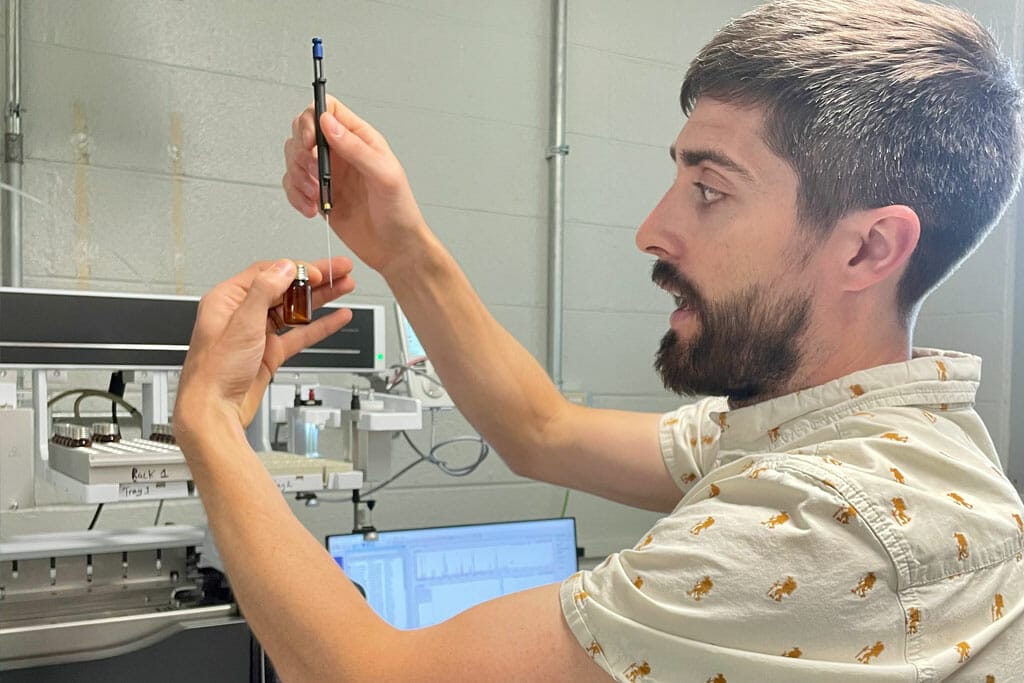

Uh oh...
It appears that you're using a severely outdated version of Safari on Windows. Many features won't work correctly, and functionality can't be guaranteed. Please try viewing this website in Edge, Mozilla, Chrome, or another modern browser. Sorry for any inconvenience this may have caused!
Read More about this safari issue.

A professor at the University of Arkansas is working to understand if rice can play a bigger role in beer making. He is particularly interested in seeing how the grain can improve the quality and acceptance of non-alcoholic alternatives.
Scott Lafontaine is an assistant professor in food chemistry, having joined the school in October of last year. He previously worked under renowned fermentation scientist Dr. Tom Shellhammer at Oregon State University. He later made a brief stop at the University of California, Davis before expatriating to a German school dedicated to the science of brewing.
The New Jersey native first became interested in beer while completing his undergraduate and master’s-level studies at Kean University.
“The program I was enrolled in – biotechnology – was intertwined with pharmaceutical development,” said Lafontaine. “I realized it wasn’t what I wanted to do in the long run. I discovered you can harvest yeast to make alcohol, and I reached out to a craft brewery in the area called Cricket Hill Brewery to see if I could intern with them. They hired me, and I started learning how to produce beer. From there I started to home brew.”
He went on to study environmental toxicology as a part of his master’s studies at Oregon State. While there he investigated how air pollution originating from China rode the jet stream across the Pacific Ocean and into the United States. It provided another segue into beer.

All photos: Brian Sorensen
“When I obtained my master’s degree in 2015 the craft beer market was still on its upward rise,” said Lafontaine. “I reached out to Tom [Shellhammer], and my skill set fit with what he was doing with his analysis of hop aromatics. IPAs were driving industry growth, and people were looking for the aromatics of hops without the bitterness. The same instrumentation I was using to analyze volatile compounds in air pollution was also important for studying hop oils.”
Lafontaine’s interest in non-alcoholic beer began after leaving Oregon State with a Ph.D. in food science. In July 2019 he arrived at Dr. Hildegarde Heymann’s laboratory at the University of California, Davis, where he studied the chemical and sensory characteristics of non-alcoholic beer. He then received a Humboldt Postdoctoral Fellowship and moved to Berlin, Germany, where he worked in the Department of Special Analytics at the Versuchs- und Lehranstalt für Brauerei (VLB). His focus there was on finding ways to promote flavor stability in non-alcoholic beer.
Working in Europe provided a closer look at the emerging consumer trend of non-alcoholic beer.
“I could see the writing on the wall,” said Lafontaine. “Non-alcoholic beer was about to take off, but there wasn’t much research done at that point. If a beer travels a long distance and sits on a shelf for a period of time, are there things in hops that you can use – such as enzymes – that can influence its flavor stability? Are there certain compounds derived from hops or malt that impact flavor during distribution? Those were some of the questions I was asking.”
The University of Arkansas started its brewing certificate program in 2020. It consists of courses from the Dale Bumpers College of Agricultural, Food and Life Sciences, the Fulbright College of Arts and Sciences, and the College of Engineering. The program’s first two students completed the 15 hours of required coursework last year, and the program continues to see an increase in student interest.
Lafontaine – whose brother-in-law grew up in nearby Elkins – took note of the program when looking for his next career move. “I thought maybe I could fit in there,” he said. “It appeared to need a boost of energy, and somebody with the background to help define its path forward.”
Arkansas’s rich agricultural history was also a draw to the Fayetteville campus for Lafontaine.
Continue Reading At Fayetteville Flyer
We do the work.
You check your email.
Sign up for our weekly e-news.
Get stories sent straight to your inbox!









Like this story? Read more from Fayetteville Flyer - Brian Sorensen
One of the most revered breweries in Arkansas turns ten this...
A new brewery opened in east Fayetteville last week. Very few people knew...
Researchers with the Arkansas Agricultural Experiment Station recently...
Join the Conversation
Leave a Comment